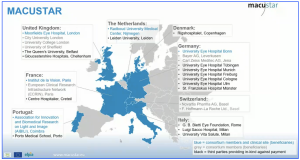The MACUSTAR consortium, supported by the Innovative Medicines Initiative, has received a further support of funding from industry partners Bayer, Novartis and Roche, agreed to a €3 million grant to extend their studies by an additional three years, until 2027. The MACUSTAR consortium is extending the duration of a Europe-wide clinical study on age-related macular degeneration (AMD) under the coordination of the Department of Ophthalmology at the University Hospital Bonn (UKB). The MACUSTAR project is a clinical study aimed to develop novel clinical endpoints for patients with either early or intermediate AMD (iAMD). The project is funded by the Innovative Medicines Initiative (IMI) supported by the European Commission and the European Federation of Pharmaceutical Industries and Associations (EFPIA).
Researchers supported by the consortium have previously identified a significant unmet need for treatment options in early and intermediate age-related macular degeneration (iAMD). While there are some valuable treatments for late AMD, using particular agents slowing the progression of the degeneration of the disease, the “holy grail” for a therapy for the ophthalmic community is to have a process to intervene earlier in the pathology, and thereby prevent the later stages of the disease aimed at minimising visual loss. Prof. Dr. Frank G. Holz, Director of the UKB Department of Ophthalmology, has previously commented that this goal can be tricky and challenging as there may be no universally accepted clinical endpoints for early or intermediate stages of the disease. How to design, use and measure the “right endpoint” is the goal for MACUSTAR. For example, Prof. Holz stated that measuring a patient with earlier or intermediate AMD with BCVA “would not be helpful as it would may be maintained for a long period of time until it crashes alongside into late-stage disease development, so we need other endpoints accepted by the regulatory authorities to test interventions in these earlier stages”. In brief, the MACUSTAR investigators are aimed at assessing methods for structural, functional, PROs tests, reliable test / re-test processes, and how the community can differentiate between different disease states, and how they may change over time. This gap in the research work was conducted to develop key outcomes supported with expert academic, clinical and commercial organisations, using state-of-the-art imaging techniques and vision testing, as well as patient-reported outcome measures that capture the impact of the disease on patients’ quality of life.
According to the recent update, MACUSTAR is the largest systematic study on intermediate AMD to date, aimed to identify which parameters or which combination of different markers provides the best approach to test new therapeutic strategies to be accepted by the regulatory authorities. Prof. Dr. Robert Finger, a co-ordinator of the consortium, now based in Director of the Eye Clinic at the University Medicine Mannheim (UMM), has commented that the “evaluation of the baseline and 3-year follow-up data has already led to significant new advances in knowledge, with regard to the heterogeneity and prognostic factors of the disease”. In addition, an announcement from the MACUSTAR website stated that “the extension of this study is expected to strengthen the understanding of how AMD evolves over time, enabling earlier detection of progression and facilitating development of innovative treatments in the future”.

